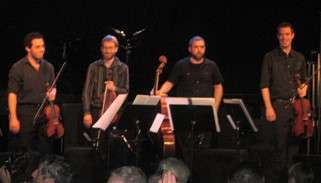|
Back
Torture, Triumph and Enigma New York
Poisson Rouge
11/08/2011 -
In Memoriam Henryk Mikolaj Górecki (1933-2010)
Henryk Mikolaj Górecki: String Quartet No. 2 ("Quasi una fantasia"), Op. 64 – Kleines Requiem für eine Polka for Piano and 13 Instruments, Op. 66
Introduction by Robert Hurwitz; JACK Quartet: Christopher Otto, Ari Streisfeld (Violins), John Pickford Richards (Viola), Kevin McFarland (Cello)
Ensemble Signal, Brad Lubman (Conductor and Co-founder)

H. Górecki (© Le Poisson Rouge)
Before this one-hour tribute to the great Polish composer Henryk Mikolaj Górecki, presented in partnership with the Polish Cultural Institute in New York on the one-year anniversary of the composer's passing on November 10, 2010, Robert Hurwitz, the President of Nonesuch Records, made a startling comparison.
“Henryk Mikolaj Górecki, Roman Polanski and Jerzy Kosinski,” he noted, “were all born in Poland in 1933. They all were five years old when the Nazis invaded...”
Such experiences marked their entire creative lives, said Mr. Hurwitz. For those who accept the Mozart/Stravinsky theory, that artistic genius inhabits a separate domain from everyday life, Mr. Hurwitz may be off base. But to the rapt packed audience at Poisson Rouge last night, this hour in memoriam for the Górecki obviously was affected by a sadness, mortal tragedy, a seriousness beneath the jocularity, which obviously linked his life and his work.
The composer has been an icon of sorts for his Third Symphony–the symphony of sad songs–which Mr. Hurwitz had recorded, reaching startling sales, staggering the composer himself. (More on that later). But the two works played last night, by the masterful JACK Quartet and the inventive Signal Ensemble, showed the enigma of Górecki. Not ambiguous (his music is straight out, almost blatant), not amorphous (we easily understand the emotions of each section). Nobody, though, should claim to “know” a work by Górecki. One can only hear it...and in a way, bear his cross.
The enigma was shown in the title of his second work, Requiem for a Small Polka. What could he possibly mean by merging the holiest of all sacrements with the most frivolous Polish dance?

B. Lubman (© Coco T. Dawg)
The Signal Ensemble, thankfully, did not answer the question with their playing. No one answer could suffice.
The piano began with the usual sad Górecki style song, with a few instruments chirping in. That was par for the course. Górecki, though, much like Mozart, never ever gives a clue where he is going. Over the next minutes, he may have built up the tension, as a good composer should. But then, out of nowhere, a honky-tonk piano opened the gates for aforesaid polka. Though not really a polka. Its bumptious rhythms could have been written by early Weill or Hindemith, or any of the 1920’s Berlin composers. Harmonically, the tunes were macabre, dissonant, one could say evil.
What was this polka? And what were Górecki’s strange contrasts for requiem and for dance? Mr. Lubman conducted his small orchestra (13 instruments plus piano) with a fervency and then a sublimity, all of it forward, blatant, strident, and holy at times. Górecki grabs you that way. He is not an “intellectual” composer, but he offers music from the selfsame strange heart which generated the best work of Polanski and Kosinski.
Mr. Hurwitz was equally surprising in the phrase that Górecki was a “folk musician.” But this was no Woody Guthrie. He had grown up in a tortured world, and his music came from that world, just as Kosinski’s first novels came from the woods of Poland where a child had taken refuge.

JACK Quartet at Poisson Rouge (© Coco T. Dawg)
The JACK Quartet opened this program with a work I had heard many times, the Quasi una fantasia. Again, the mood was doleful, that utter sadness turning into a burning, almost sarcastic sawing away of the two violinists in a group of simple tunes almost written in thirds.
But Górecki doesn’t go that far. The thirds are actually dissonances, perhaps a quartet tone or half tone apart. The JACK Quartet played with a savagery I could never imagine on the recording I have.
What did he mean? My mind skipped to the most grotesque nursery rhyme ever written. That simple, “Ring around a rosie, pocket full of posie...all fall down.” Not simple, but a tune for the Black Plague, the death of the singer.
Górecki achieves that death, that torment, a few notes of hope (the first bars of “Silent Night” in the finale), but never far from the devil...within us, within our society.
Hearing these two works together gives one a slight vision–a Peeping Tom quick glance–into the mind of one of Poland’s extraordinary catalogue of 20th Century musicians. Each of them–Szymanowski, Penderecki, Lutoslawski and others–had their own aural visions. But I doubt if any were so outward and extreme.
And what did success–the great success of the Third Symphony mean to Górecki? Mr. Hurwitz put it plainly. “He was, of course, overwhelmed, as we all were. Not, though, with its sales or popularity.
“He said to me that he was overwhelmed that so many people had been so deeply moved.”
As we still are.
CODA: Some messages came to me recently criticizing my mentioning that conductor Robert Spano was wasting his time with the Atlanta Symphony, playing his music for “Tea Party audiences.” For this misplaced canard, I must apologize. Though for some who mentioned that I shouldn’t confuse political thought with appreciation for art...well, I hope to be allowed to differ. The review above may give some indication of these links.
Harry Rolnick
|